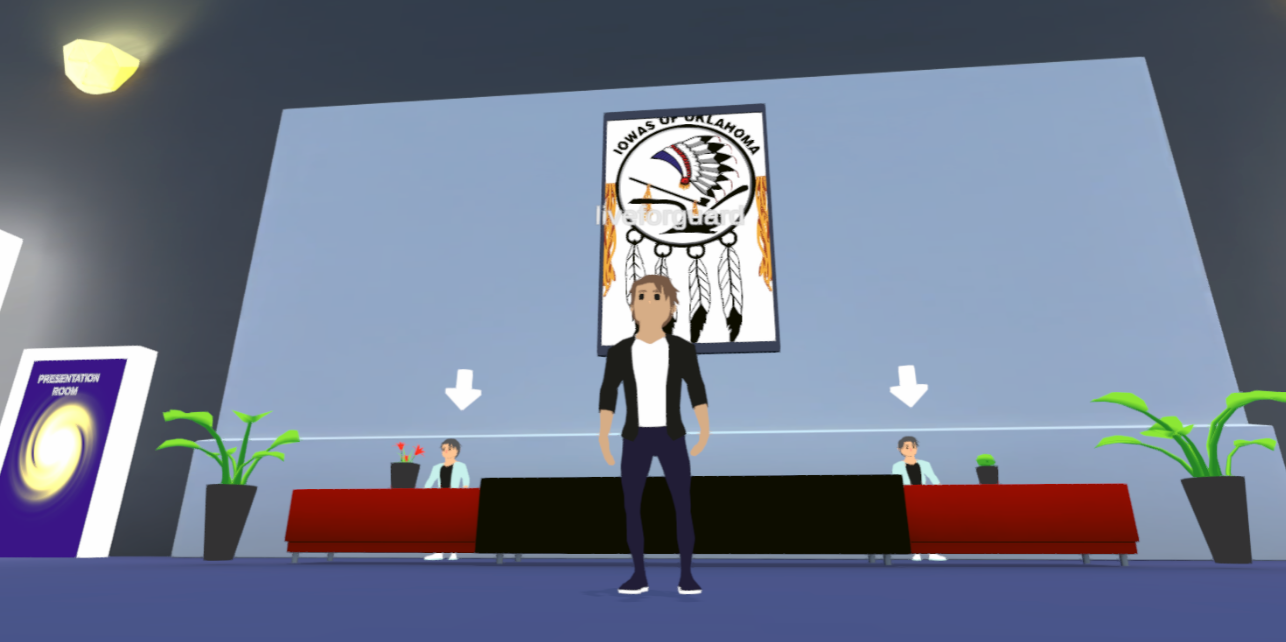
- Details
- By Adam Proctor
PERKINS, Okla. — Iowa Tribe Higher Education Director Regina Riley’s virtual avatar stands in a small, partially blank room, one wall emblazoned with the logo and title of the Iowa Tribe of Oklahoma.
This is where students piloting similar avatars while participating in the Iowa Tribe’s Nov. 18 Virtual College Fair will gather, Riley said.
More than 790 participants from 13 school districts so far have signed up for the fair, which will invite them to connect using browser-based client GamerJibe and meet with 50 colleges and universities. All Iowa tribal members in grades nine through 12 are invited to RSVP for the event.
Their avatars will explore a virtual space alongside college, military and trade school recruiters.
“There will be zones where kids can hear everything going on, and then you can walk up to a booth and consolidate your sound to an area where a booth is at,” Riley said.
It could also be the future of such events amid Covid-19, she added.
“Using e-sports as a platform for higher education… I think it's going to be the new wave — putting that many people in an in-person event is going to be really hard,” Riley said. “I think this could be a turning point for how tribes and organizations gear that next-gen technology toward something kids are familiar with.”
Riley said she happened upon the idea while watching television one night, when she saw an ad for a virtual job fair.
“They were actually having this job fair with an avatar, like a video game. What better way could we have to get kids into this than a video game-style college fair?” Riley said.
Around May, Riley said, a partnership was forged with University of Oklahoma e-gaming department head Michael Aguilera.
“He was just like, this is a wonderful idea,” Riley said. “We developed this contract and as far as we can tell, this is the first one ever, the first higher education fair in this format.”
The virtual college fair isn’t the only thing moved online in the wake of Covid-19, Riley said — tutoring has gone that route, too.
The Iowa Tribe has hosted a tutoring program through their public library and tutor.com since 2017. It started seeing more widespread use, Riley said, when Covid-19 began shutting down classrooms.
“The desperation came when Covid hit. Every school, every tribal member, every person was looking for virtual resources that would help in this situation,” Riley said. “Tutor.com is now an essential for education.”
Efforts like these are an attempt to meet people halfway, such as students who can’t come back to newly opened classrooms because their parents are at risk of severe Covid-19 symptoms, Riley said.
“We're just trying to find creative ways to best reach people's needs,” Riley said.
These initiatives follow explosive growth in education, Riley said. The school’s education system has grown 160.288 percent since 2016.
Keeping that growth going, and keeping those kids involved in the education system through higher learning is crucial, Riley said.
The higher education director outlined programs such as the “college scholarship portfolio,” which chronicles volunteer work, school work, community service and religious activities beginning in middle school. That’s in addition to the Talking Circle and Unity Youth Council groups, which develop conversations around budgeting, life skills and education choices, Riley said.
Covid-19 can’t be allowed to slow down that growth, she added — which is what prompted events like the Virtual College Fair.
“If we lost momentum now, how many would fall off? How many would be left behind? And so we want to make sure Iowa tribal members are not left behind,” Riley said. “I was glad that the University of Oklahoma listened to me and agreed to partner. It’s been great to work with an organization that is so passionate about making sure the smallest, most remote school systems have access to equal resources.”
Help us defend tribal sovereignty.
At Native News Online, our mission is rooted in telling the stories that strengthen sovereignty and uplift Indigenous voices — not just at year’s end, but every single day.
Because of your generosity last year, we were able to keep our reporters on the ground in tribal communities, at national gatherings and in the halls of Congress — covering the issues that matter most to Indian Country: sovereignty, culture, education, health and economic opportunity.
That support sustained us through a tough year in 2025. Now, as we look to the year ahead, we need your help right now to ensure warrior journalism remains strong — reporting that defends tribal sovereignty, amplifies Native truth, and holds power accountable.
 The stakes couldn't be higher. Your support keeps Native voices heard, Native stories told and Native sovereignty defended.
The stakes couldn't be higher. Your support keeps Native voices heard, Native stories told and Native sovereignty defended.
Stand with Warrior Journalism today.
Levi Rickert (Potawatomi), Editor & Publisher
